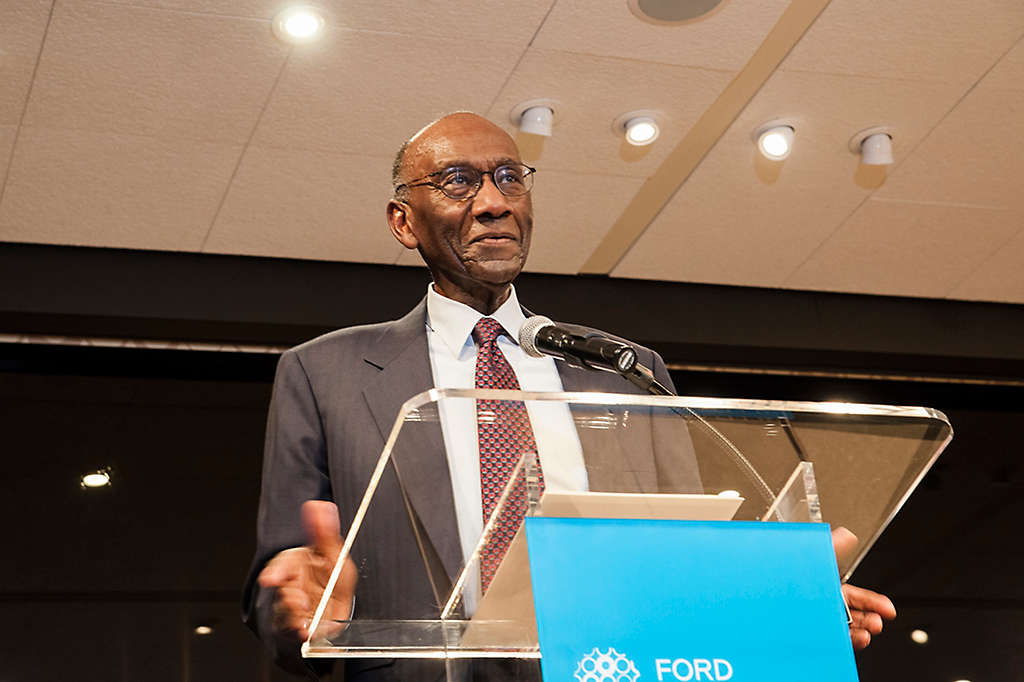History
The life of Franklin A. Thomas, our first Black Board member.
New York Life | February 1, 2025
In 1972, Franklin A. Thomas was elected as the first African American to New York Life’s Board of Directors.

The son of immigrant parents from Barbados and Antigua, Franklin A. Thomas was born on May 27, 1934, and raised in the Bedford-Stuyvesant neighborhood of Brooklyn, New York. From a very early age, Thomas and his sisters were taught to be confident and set lofty goals, traits they would carry throughout their lives. “A big project with a hefty challenge to it? That’s an opportunity, not a threat,” Thomas stated decades later.
Excelling in the classroom and on the basketball court, following his graduation from high school in 1952, Thomas turned down a number of athletic scholarships and opted for an academic scholarship to Columbia University. There, while pursuing his studies, his competitive spirit and love of the game led him to the gym where he became the first Black captain of an Ivy League basketball team and set several rebounding records that still stand today.
After earning his B.A., Thomas served as a navigator in the Strategic Air Command of the U.S. Air Force. Afterwards, he returned to Columbia where he earned his law degree in 1963.
Breaking into public life
In the three years following his graduation from Columbia Law School, Thomas worked as an attorney for several organizations. During this time, he notably served as New York City’s Deputy Police Commissioner in charge of Legal Matters. In 1967, his work caught the attention of Robert F. Kennedy and Jacob Javits, New York’s two U.S. senators who were seeking a leader for the newly established Bedford-Stuyvesant Restoration Corporation. This nonprofit was part of President Lyndon B. Johnson’s Great Society legislation aimed at channeling money and resources into one of the largest Black communities in the nation. “Bed-Stuy” native Thomas was elected the Corporation’s first president and chief executive, a role he held for 10 years. Under his watch, more than $60 million was raised from public and private funds, hundreds of homes and businesses were built or rehabilitated, and the famed Billie Holiday Theatre was established.
Corporate boards
Although he still had not even reached his 40th birthday, Thomas continued to break down barriers outside of his work at the Corporation. In 1972, he was elected as the first Black person to serve on New York Life’s Board of Directors and served the company for 16 years until his retirement in 1988. Three years earlier in 1969, Thomas had become the first Black individual to serve on the board of Citibank, a seat he would hold for a remarkable 40 years.
Philanthropic endeavors
After leaving the Bedford-Stuyvesant Restoration Corporation in 1977, Thomas moved into private practice. That same year he became a trustee of the Ford Foundation, a philanthropic group founded in 1936 that was struggling to stay afloat due to inflation and mismanagement. In 1979, out of a pool of 300 candidates, Thomas was chosen as the Foundation’s first Black president. “Good for Frank Thomas, good for the Ford Foundation, good for the country,” stated The New York Times.
Over the next 17 years Thomas righted the Ford Foundation and expanded its reach to engage on global human rights issues and, in particular, the plight of the people of South Africa. When he stepped down in 1996, the Ford Foundation’s endowment stood at $7 billion, which has grown to $16 billion today.
Later in his career, Thomas remained active in organizations and causes close to his heart, including managing the American office of the Nelson Mandela Children’s Fund and serving as chairman of the September 11th Fund.
Thomas died in his home in Manhattan on December 22, 2021. In recognition of his groundbreaking accomplishments and service to our company and the community at large, New York Life made a charitable contribution in his name to The History Makers, a non-profit dedicated to recording and preserving the oral histories of famous, as well as unsung, members of the Black community.
This article was originally published March 24, 2022.
RELATED CONTENT
Go back to our newsroom to read more stories.
Media contact
Kevin Maher
New York Life Insurance Company
(212) 576-7937
Kevin_B_Maher@newyorklife.com



